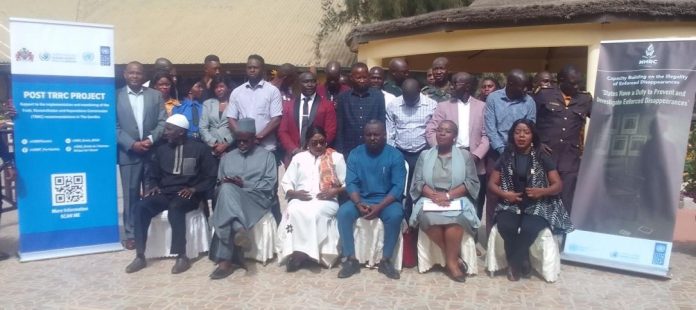By Nelson Manneh
The National Human Rights Commission (NHRC) launched a four-day training program on Tuesday aimed at educating justice and security personnel about the illegality of enforced disappearances, a dark chapter documented extensively during The Gambia’s Truth, Reconciliation and Reparations Commission (TRRC) proceedings.
Enforced disappearances—used as a tool of repression by the former government—were among the violations spotlighted by the TRRC. In response, the government’s White Paper on the TRRC report underscored a firm commitment to accountability and the prevention of such abuses in the future, explicitly recommending that the NHRC lead efforts to train security forces on the legal ramifications and human rights implications of these acts.
The NHRC’s Directorate of Legal and Investigation is overseeing the workshop, which targets 30 members of the justice and security sectors. The initiative seeks to strengthen institutional knowledge and compliance with international law, particularly the International Convention for the Protection of All Persons from Enforced Disappearance (ICPPED), which categorically prohibits secret detentions and recognises enforced disappearance as a crime against humanity when committed systematically.
Speaking at the launch, NHRC Vice Chairperson Jainaba Johm emphasised the global consensus on the illegality of enforced disappearance. “The Truth, Reconciliation and Reparations Commission revealed the harrowing accounts of individuals forcibly taken and never traced,” Ms. Johm said. “Our security personnel must understand that the era of handing people over under opaque orders is over.”
She further explained that the country’s new legal framework explicitly bans secret detentions and mandates prompt recording and notification of arrests to police authorities, with regular follow-ups every three months on detainees’ whereabouts.
Mandisa Mashologu, the United Nations Development Programme’s Resident Representative in The Gambia, echoed these concerns, highlighting the severe and lasting trauma suffered by victims and their families. “Enforced disappearances are illegal under all circumstances, including war or political upheaval,” Ms. Mashologu said. “Victims often endure secret detention, torture, and the constant threat of death. Even when freed, the psychological scars linger for life, as does the anguish of their loved ones.”


















